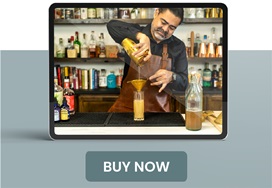
In the previous article, we explored the history and concept of apprenticeship and how it applies to tending bar. While there is no textbook for apprentice bartenders, there’s no shortage of ways to learn a new set of skills. In this article, we’ll examine what the back of house has to teach the front of house by looking closer at an age-old kitchen tradition: The Stage Shift.
What is a “Stage Shift”?
Much of bartending comes from traditions of the kitchen, and it’s no mistake that chef coats, knife skills, and back-of-house lingo are all common threads. Checking and double-checking mis-en-place is a pre-opening ritual. Drinks are a la minute and always soigné AF, (be it a can of Miller High Life or a sparkling Negroni). Our rushes are to be handled with composure, and the boards are to be cleared ASAP, with no misfires.
One kitchen term in particular, “stage” (pronounced stahhdge), is especially important to bartending.
“Stagiaire”, French, pronounced “stazhjer”
Translation: trainee, apprentice, or intern.
The word has French roots, as does most tradition in modern kitchens. “Stagiaire” translates roughly to trainee, or, apprentice. In practice, a stage is a generally an unpaid working interview or a learning exchange. Would-be line cooks or bartenders get a chance to see what real service looks like, and the chef-de-cuisine or lead bartender gets a chance to see how the candidate performs in a “real life” situation.
Not limited to job interviews, stages are also sometimes extended as a professional courtesy and community building exercise, for those looking to examine different techniques or styles of service. (This is more common at higher-end cocktail bars and restaurants.) While some may raise an eyebrow at the level of experience gleaned from a night of service in a strange bar, it all depends on your point of view, and where you stage.
Straight to the Source
For those willing to make the journey, different markets or destination bars and restaurants can offer techniques and lessons beyond the bar down your street.
Sean “Admiral” Enright, GM of Spork in Pittsburgh, PA, has been in the restaurant industry for over 25 years and had the opportunity to stage at molecular-mixology mecca, Aviary, in Chicago. “There are really no other opportunities to experience something like that unless you go straight to the source as I did at Aviary,” says Enright. As the world of food and beverage continues to evolve, it’s the bartender that’s keeping their professional mis-en-place tight that often makes the most of opportunity.
“With all the unique, different styles of bartending available to the consumer now, I think stages are invaluable tools,” says Enright, “any education raises the quality of service that you provide to your guests.”
While your home bar might not be ready for an extensive draft cocktail system, ice program or barrel-aged cocktail calendar, any successful bar will always have something you can bring home and adapt to your own systems. “Try to use the knowledge gained as it will be most useful in your setting,” says Enright.
Seizing the Opportunity
If you have your eyes on a prize like a night of service at Aviary or another top-shelf destination, coming correct is a priority. You’re not only representing yourself, but you’re representing your home bar and market. Treat these interactions as you would any job interview.
If you’re reaching out to a place you have no prior relationship with, work the appropriate channels. Emails and phone calls should be professional and succinct.
Leaning on your Network
If you’re looking to your own social network to help make a connection, remember to pay these kinds of favors forward.The strongest relationships are premised on mutual value, so bring something to the table and help build community.
If you’ve cultivated good relationships around your city, asking for a few hours of instruction behind someone else’s bar is often an easy order to fill. Many are happy to teach what they have learned, and having a new face behind the bar can break up the monotony of a mid-week shift. Additionally, at the end of a successful stage, you’ve either landed a job or cast yourself as someone to call should a position open up.
Cultivating this same work ethic and goodwill when reaching out to bars on a national or even international level will not only help get you what you want, but expands the potential for future career moves. At the very least, you’ve added a new technique or two to your arsenal.
Starting the Connection
If you don’t have a personal network to leverage, there’s nothing wrong with reaching out directly by email.
An example of an email might look something like this:
Hello (Bar Manager),
My name is Jane Bartender. I’m a colleague of (former stage, work connection, former employee, etc). After hearing about their experience as a stagiaire with your program, I was intrigued. We’ve since had many conversations on the subject, and they’ve introduced me to some new techniques. I expressed a desire to seek out a stagiaire position and follow their lead, and they suggested that I contact you.
I was hoping to visit your market in the next few months, and was wondering if we could discuss a potential stagiaire arrangement. My home bar is wine-focused, and I was hoping to broaden my knowledge base during my visit. Your draft cocktail system is something both myself and my bar’s owners are curious about.
I know running a program such as Fancypants puts a lot on your plate, and I thank you for your time.
I hope to hear from you at your earliest convenience.
Best,
Jane Bartender
All in the Family
If you work for a bar that is part of a larger restaurant family with multiple concepts, you may be ahead of the game. A stage may be as easy as contacting the Beverage Manager at a sister restaurant. If you’re curious about a stage in a sister restaurant, schedule a meeting with your manager and start the process.
Not only does it give you some of the knowledge you’re looking for, but the intimidation factor of being a fish out of water is diminished if the person overseeing your stage is someone you may know or have worked with in the past.
In these instances, a phone call or setting up some face-time can get the ball rolling. Even if you have a casual relationship with your colleague, keeping your professional game face on is never a bad call. Don’t be overly familiar or disrespectful. You’re asking to be a guest behind their bar.
A simple email or phone call would look something like this:
Hey (Beverage Manager,)
I mentioned to my General Manager that I was interested in learning how you run the barrel-age portion of your beverage program and he said to ask you for a tour. I was hoping to come by sometime next week if you’re not busy! If you’ll be loading a new barrel any time soon, I would also love to see how you build your drinks and potentially help out if you need an extra set of hands.
Thanks,
Joe Bartender
Making the Pieces Fit
A stage is a great way to apprentice yourself while beefing up your resume and skill set. Getting outside of your comfort zone and visiting new markets and bars will only make you a better hospitality professional. After you’ve completed a turn or two behind a different bar, take some time to marinate in the experience.
“I recommend reflecting on the experience for 1-2 weeks after your stage,” says Enright. It can be tempting to put your new knowledge to work right away, but, he adds, “not all the pieces will fit, no matter how hard you try and force them. It’s best to have a full, well mapped idea of how you’re going to use your new knowledge.”
In the next article, we’ll examine a less formal cousin to the stage, the guest shift. While traditionally more free-wheeling than the stagiaire, the guest bartender has every opportunity to learn a few new tricks while making a few dollars besides.




